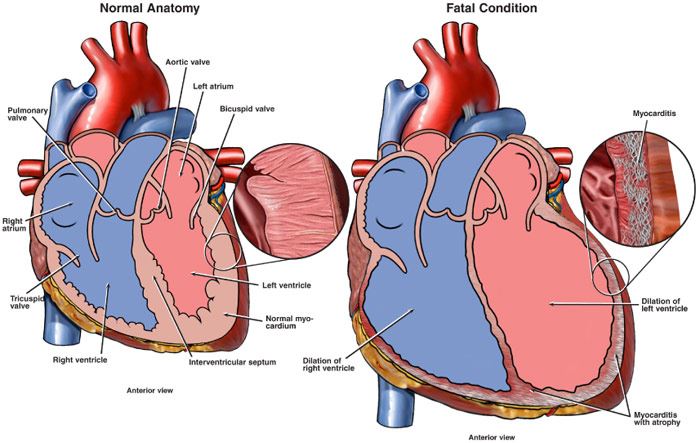Myocarditis
Myocarditis is an inflammation of the heart muscle (myocardium). This muscle is responsible for contracting and relaxing to pump blood in and out of the heart and to the rest of the body. When this muscle becomes inflamed, its ability to pump blood becomes less effective causing arrhythmias. Myocarditis is different than pericarditis. Pericarditis is an inflammation of the sac that surrounds the heart (pericardium) and not the heart muscle itself. However, it is not unusual to have a patient present with both pericarditis and myocarditis.

Medical Illustration Copyright © 2019 Nucleus Medical Media, All rights reserved.
Causes of Myocarditis
Often, the cause of myocarditis isn't identified. However, many infections have been associated with myocarditis. These infections are most commonly caused by some of these germs:
- Viruses that cause the common cold, hepatitis B and C; parvovirus and herpes simplex virus.
- Bacteria that causes diphtheria and the tick-borne bacterium responsible for lyme disease.
- Fungi such as yeast infections.
- Parasites such as trypanosoma cruzi that leads to chagas’ disease.
Other conditions that contribute to the development of myocarditis:
- Autoimmune Myocarditis: A condition in which the heart muscle becomes inflamed.
- Exposure to certain chemicals such as carbon monoxide or radiation.
- Autoimmune Disease: A condition in which your immune system mistakenly attacks your body (e.g. lupus, rheumatoid arthritis and scleroderma).
- Certain cancer and seizure medications.
- Use of cocaine
- Vasculitis
Symptoms of Myocarditis
Myocarditis can affect anyone, occur at any age, and may proceed without displaying any symptoms. Symptoms depend on the cause and severity of myocarditis. Various symptoms include:
- Body aches/Headache
- Chest pain
- Fatigue
- Lightheadedness/Fainting
- Fever
- Heart palpitations
- Lower extremity swelling
- Painful and tender joints most often in the knees, ankles, elbows, and wrists.
- Shortness of breath
- Sudden death in young adults
Diagnosis of Myocarditis
Early diagnosis is key to preventing long-term heart damage. After a physical examination, your doctor might order one or more diagnostic tests to confirm that you have myocarditis and determine its severity, including:
- Blood tests
- Electrocardiogram (EKG/ECG)
- Echocardiogram (ECHO)
- Magnetic resonance imaging (MRI)
- Biopsy
Treatment of Myocarditis
Treatment depends on the severity of the myocardial inflammation. In many cases, myocarditis improves on its own or with treatment, leading to a complete recovery. If your myocarditis continues, your doctor may recommend:
Lifestyle Changes
- Avoid alcohol consumption.
- Avoid smoking.
- Eat a heart-healthy diet.
- Exercise under the directions of your doctor.
- Fluid restriction.
- Make and keep appointments to see your doctor for routine check-ups and follow-up tests.
Medications
- Anti-Inflammatory medications will help reduce inflammation and relief pain.
- Diuretics “water pills” will help reduce the amount of fluid retention in your body.
